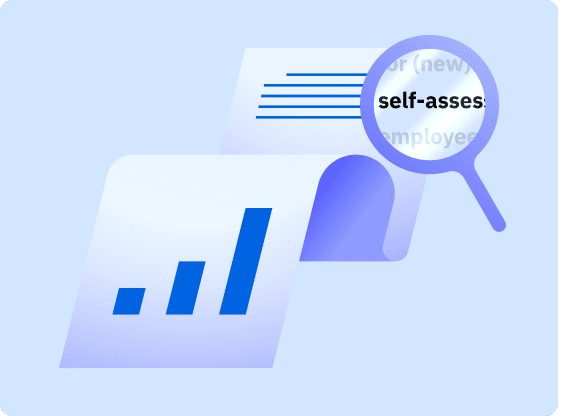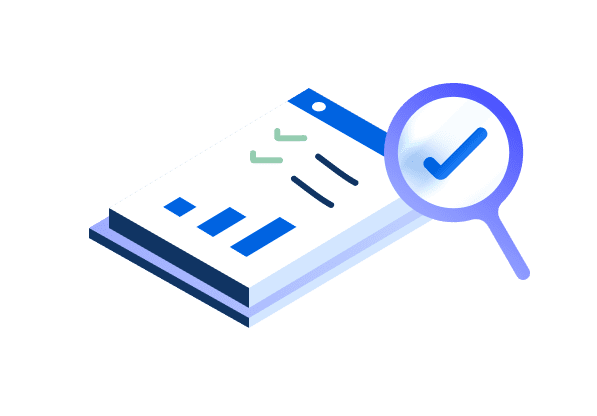4 popular employee self-assessment tools
In this article we explore four popular employee self-assessment tools. Find out about tools to empower self-awareness and professional growth.

Self-assessment gives employees a better insight into the strengths, weaknesses, and personality traits that affect their work. This article explains how self-assessment works and which self-assessment tools are available to help you get started.
But what is self-assessment?Copied
Success begins with self-awareness. You need to know what you want and what you can do in order to make a conscious decision about possible career paths. The great thing about self-assessment tests is that there’s no ‘pass’ or ‘fail’, as there are no wrong or right answers.
Self-assessments tell you more about yourself by gathering information about work-related values, preferences, interests, personality types, and abilities. Once you’ve mapped all these variables, it makes it a lot easier to find a job or role that matches your profile.
What does a self-assessment tool consist of?Copied
To create a clearly defined professional profile, you need to take the following factors into careful consideration:
1. Work-related values
Work-related values, convictions, and ideas are what you believe to be important at a personal level, for example autonomy, security, flexibility, or work-life balance.
They also relate to your organization’s social profile. For example, if you champion environmental or social causes, then you’re not likely to want to work for a company that causes environmental destruction or condones dubious labor practises in developing countries.
2. Interests
Your interests determine what you like doing most. Psychological studies have shown that people who perform the same type of work often have the same interests. The Strong Interest Inventory (named after the psychologist E.K. Strong) takes someone’s interests as a strong indicator for a particular career path.
3. Personality types
Personality types are a combination of social and professional drives, needs, and attitudes. Your personality type largely determines whether you’re suitable for a certain type of work or working environment. Swiss psychiatrist Carl Jung’s personality theory forms the basis of the popular Myers-Briggs Type Indicator (MBTI) assessment tool.
4. Abilities
Abilities are largely determined by genetics, although you can also acquire, master, and hone certain abilities with training and practice. They determine whether or not you’re likely to pick up new skills easily.
Examples of abilities are mathematical insight, language, musicality, logical thinking, and manual dexterity. Your abilities determine your suitability for a certain type of work. Someone who’s all thumbs isn’t likely to make a very good carpenter, and someone with no feel for language won’t be cut out for life as a writer.

How do self-assessment tools benefit you?Copied
So, what are the main benefits of self-assessment? Here are just a few!
- The insights you glean from self-assessment give managers a clearer picture of their employees.
- It also makes describing skills and competences easier and then matching these to job and/or character profiles.
- An important aspect is actively involving staff in your evaluation. After all, they’re not just passive recipients of your feedback, but active contributors with their own insights and reflections. This also makes it easier for you to have more productive discussions.
- The additional information that self-assessments provide also simplify finding and closing skills gaps.
- What’s more, bottom-up self-assessments are more motivating than alternative top-down approaches.
Popular self-assessment toolsCopied
You can perform self-assessments in numerous ways, some of which form the basis for popular tools and methods:
1. Myers-Briggs
Katherine Briggs and Isabel Briggs Meyers created the Myers-Briggs Type Indicator test based on the sixteen personality types identified by Carl Jung. He based these on observations of people and how they expressed themselves, interpreted information, made decisions, and conducted their lives.
Jung grouped the sixteen personality types into four categories:
Analysts
This group consists of:
- Architects – imaginative, strategic thinkers who have a plan for everything
- Logicians – innovative types who display an insatiable appetite for knowledge
- Commanders – courageous, imaginative, strong leaders who always know how to move forward or find a solution
- Debaters – intelligent, curious thinkers who love intellectual challenges
Diplomats
This group consists of:
- Advocates – quiet types who prefer to take a backstage role, yet are often inspirational and relentless idealists
- Mediators – poetic, pleasant, and altruistic types
- Protagonists – charismatic leaders who know how to inspire their audiences and co-workers
- Campaigners – enthusiastic, creative, and social free spirits
Sentinels
This group consists of:
- Logisticians
- Defenders
- Executives
- Consuls
All practical, dedicated, reliable, and helpful types who are skilled at managing people and projects.
Explorers
This group consists of:
- Virtuosi
- Adventurers
- Entrepreneurs
- Entertainers
All exhibit charm, spontaneity, and flexibility and are generally energetic and game to try out new things.
2. DISC
The DISC theory is a behavioral model based on the work of William Moulton Marston (1893–1947). The model uses four quadrants or dimensions to group personality types:
- Dominance – refers to confidence and an emphasis on accomplishing results
- Influence – describes the process of persuasion and building relationships with others
- Steadiness – emphasizes cooperation, sincerity, and dependability
- Conscientiousness – focuses on quality and accuracy as related to expertise and competency
By mapping these dimensions, you’ll get a better impression of the types of work, job, or environment that would suit your personality. self-assessment tools can be valuable in this process. Consider using them to understand your interests, values, and skillsets better.
3. Big Five
The Big Five personality theory assigns a score based on the following five personality traits:
- Extraversion – outgoing/energetic vs. solitary/reserved
- Agreeableness – friendly/compassionate vs. challenging/callous
- Neuroticism – sensitive/nervous vs. resilient/confident
- Conscientiousness – efficient/organized vs. extravagant/careless
- Openness to experience – inventive/curious vs. consistent/cautious
4. AG5 skills management
AG5’s skills management software is a great tool to have your staff perform a skills self-assessment. It summarizes which roles or projects your staff are most suited to.
The main advantage is that it helps you deploy your staff more versatilely. Not only is this beneficial to your organization as a whole, but makes work more varied and interesting for your employees. What’s more, taking this approach encourages reskilling, which will be becoming ever-more important in the years to come.
Find out more about our software or schedule an online demo free of charge and with no strings attached!
Get going now!Copied
So, we can conclude that self-assessment is a great way to gain better insights into your personal qualities and work-related personality traits. It reveals what your interests, strengths, and weaknesses are, which, in turn, benefits both you and your employer. Take a dive into the world of self-assessment with one of the tools we’ve listed above and take you professional self-awareness to the next level.
Use AG5 to identify skill gaps
Say goodbye to Excel matrices. Start using AG5’s plug and play skill matrix software.
ISO27001 certified
Start your 14-day free trial

